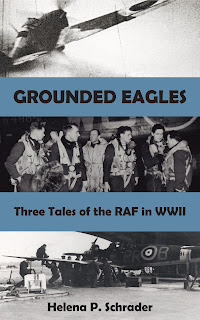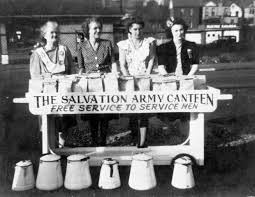One of the main objectives when writing "Where Eagles Never Flew" was to show -- and give credit to -- the various non-flying contributors to British victory. Some of the least dramatic, least heroic and least glamorous were the women who served in the various volunteer organizations that gave out tea, sandwiches and buns to those fighting -- whether they were being evacuated from Dunkirk or preparing for D-Day. When the novel opens, Emily Priestman is just another volunteer at the Salvation Army.
"I hope you don't mind me asking, but what is a nice girl like you doing in a place like this?"
"What makes you think I'm a nice girl?" Emily quipped back. Without thinking, she fell into the kind of repartee that was so much a part of her University days.
He laughed, but retorted without missing a beat: "Innocent until proven guilty -- or some such thing."
Emily has chosen to volunteer at the Salvation Army rather than joining one of the women's auxiliary services because she is fundamentally a pacifist. The daughter of Communist activists, who moved to Portsmouth to raise the level of education (and political awareness) among the working class, she went to Cambridge on a scholarship. While studying medieval history during the mid-thirties, she became active in the Peace Society -- and fell in love with a fellow-student passionately opposed to war, Michael.
She soon discovers, however, that while she and Michael share politics and values, they don't share the same sexual orientation; Michael isn't interested in women physically. That disappointment is followed by another when she learns that degrees in medieval history don't open many doors. Unable to compete for academic jobs with male graduates, she's returns to Portsmouth to live with her parents and look for other work.
Her parents live by choice in one of the most impoverished parts of a poor city. The terraced houses are dirty, dilapidated and inhabited by people on the down-and-out. As loyal Communists, Emily's parents now support Hitler because he is suddenly an ally of Stalin. They condemn the British government at every turn. In contrast, Emily's pacifism has been undermined by Hitler's aggression. Although she
has read John Maynard Keynes' "The Economic Consequences of the Peace"
and recognizes that Germany had legitimate grievances against the
post-war regime, she cannot accept that this gives Germany the right to invade its neighbors. She sees clearly that Hitler cannot be stopped by diplomatic means; she recognizes that force is the only language he understands. Emily and her parents clash over politics and and a relationship that was always cold becomes frigid.
Eventually Emily finds a job as a clerk with an insurance broker and starts work. Yet she is over-qualified for the job she is doing and her female co-workers are suspicious and jealous of her. She has the "wrong" (educated) accent, she listens to "posh" music, and reads the Times. Emily feels as lonely among them as with her parents. Working weekends at the Salvation Army with the dynamic and self-sufficient Hattie Fitzsimmons becomes the only positive feature of her life.
Then one day a young man in civilian clothes and propped up on a crutch comes to her rescue when she's trying to cope with a flood of sailors come for a hot meal. She mistakes him for a conscientious objector, only to find he's a fighter pilot injured in France. When he offers to take her up for "flip", she can't resist the temptation. The result is that all too soon she has fallen in love -- with both the pilot and the flying.
Emily will go on to fly herself in the ATA -- but that is long after the end of "Where Eagles Never Flew."
"This is the best book on the life of us fighter pilots in the Battle of Britain that I have ever seen.... I couldn't put it down."-- RAF Battle of Britain ace, Wing Commander Bob Doe.
Winner of a Hemingway Award for 20th Century Wartime
Fiction, a Maincrest Media Award for Military Fiction and Silver in the Global Book Awards.
Find out more at: https://crossseaspress.com/where-eagles-never-flew
Also by Helena P. Schrader
they took the war to Hitler.
Their chances of survival were less than fifty percent.
Their average age was 21.
This is the story of just one bomber pilot, his crew and the woman he loved.
It is intended as a tribute to them all.
or Barnes and Noble.

For more information about all my books visit: https://www.helenapschrader.com





No comments:
Post a Comment